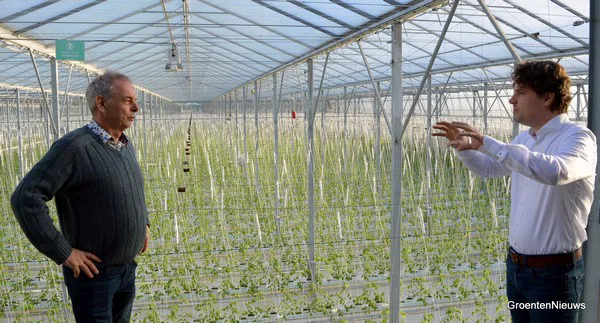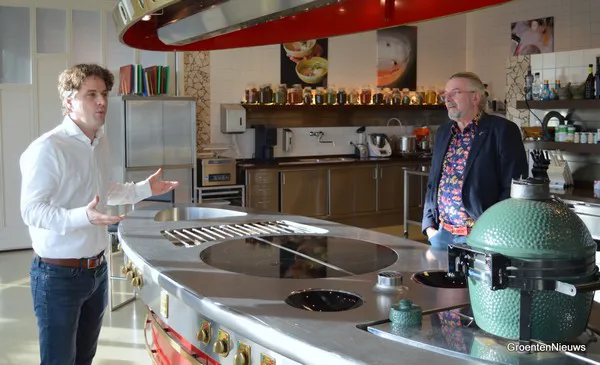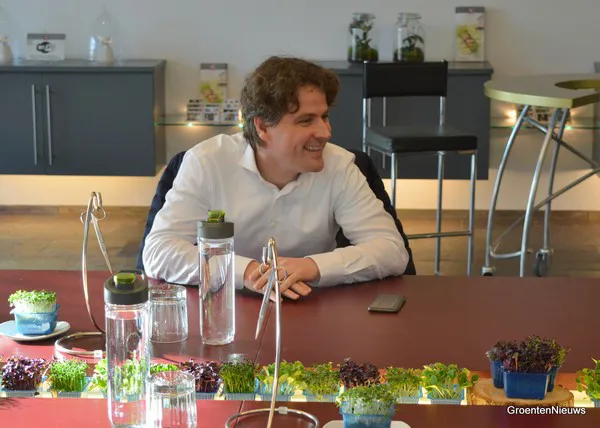"Just come and have a look," was the invitation of Wilko Wisse and Piet Zwinkels to aspiring Member of Parliament Henri Bontenbal of the CDA. They already knew each other from Twitter where they discuss energy issues. The gauntlet was picked up, a date set and so it came about that the number 17 on the list yesterday visited Duijvestijn Tomaten and Koppert Cress. Just to be able to teach 'someone who might be in the Chamber' something about greenhouse horticulture, as the initiators put it. Ted Duijvestijn and Rob Baan seized that opportunity with both hands.
 Ted and Henri on the balcony in the ID-Kas
Ted and Henri on the balcony in the ID-Kas
More energy knowledge in the Chamber
It did not take long before Henri in stood on the balcony in the tomato greenhouse in Pijnacker looking at the sustainable tomatoes behind the Twitter account @DuurzameTomaten. The approach was a good conversation about energy issues, but of course many other hot topics quickly passed in review. What about water, for example. Or labour. Or more broadly, the image of greenhouse horticulture that does not always help entrepreneurs to realize their plans.
Henri, 38 years young with 13 years of experience in the energy sector, currently as an energy strategist at grid operator Stedin, turned out to be able to spar about energy matters live in the greenhouse. He is certainly not alarmed by figures on megawatts and CHP capacities. He now wants to "stick his neck out" with that knowledge in order, once elected, to work towards a smarter, more effective and more robust energy policy. According to the prospective Member of Parliament, this requires more substantive knowledge about energy in the House.
 At Koppert Cress, Henri continued talking with Rob Baan over lunch.
At Koppert Cress, Henri continued talking with Rob Baan over lunch.
ODE
In Pijnacker, it goes without saying nowadays when it comes to energy in the greenhouse that the ODE was discussed. It is the abbreviation for the Renewable Energy Storage that is so denounced in greenhouse horticulture. An energy tax that currently causes sustainable pioneers in greenhouse horticulture to feel disproportionately hard hit. Henri called the ODE 'a weaving error', whereby 'it was forgotten to properly calculate the effects on the individual sectors on a beer mat.' At lunch at Koppert Cress, the consenting nod of Rob Baan, as well as Bart van Meurs, maker of, among other things, the film ODE for Dummies, showed their agreement. The cress grower said that rather than angry, he is currently above all, disappointed. "That is actually much worse." The corona crisis and the collapse of his sales due to the lockdown obviously do not help, but what is especially stinging is that, according to Rob, the government has shown itself to be unreliable, because sustainability is now "punished" with taxation. This is why greenhouse horticulture also protested strongly against the ODE. In vain, so far.
“It's like sending someone with an 80% score to school as punishment for tutoring,” is how the cress grower, who has now returned to gas after the ODE, described how he felt. Incidentally, Rob also reached into his own bosom and acknowledged that when the abbreviation ODE and the tax rule were introduced, he did not immediately realize what the consequences could be, so that protests did not materialize at the time.
 Henri in the chair at the table at Koppert Cress, where Carola Schouten and Phil Hogan, among others, preceded him.
Henri in the chair at the table at Koppert Cress, where Carola Schouten and Phil Hogan, among others, preceded him.
The prospective Member of Parliament and the cress grower were not completely in agreement on the ODE issue. While Rob, like many other entrepreneurs in greenhouse horticulture, points to the 'big boys' in the Rotterdam port, among others, who largely escape the dance with a 'good lobby' where the ODE is concerned, Henri wants to stay away from 'scapegoat politics' and the designation of guilty. Just like before in a radio interview in between the visiting program (after all, it is now also time to campaign).
Paradox
Where 'we' on the one hand are talking about sustainability, on the other hand 'one sustainability solution after the other threatens to be thrown off', as Henri noted earlier today. Specifically in the case of Koppert Cress in the form of a return to gas due to the ODE, while at Duijvestijn Tomaten a mandatory upgrade of the geothermal energy installation this year, given all the new rules, always creates some uncertainty.
But elsewhere in greenhouse horticulture it is also difficult for entrepreneurs to make plans for the future without certainty about the course the government wants to take. Biomass is an example here. The social pressure on an alternative energy source that was initially heavily subsidized by the government means that entrepreneurs who invested in it are sometimes already being called back without even burning anything from biomass. Paradoxically, Henri also sees a discussion about raw materials for making solar panels and the environmental issues surrounding batteries, while these are techniques that can help make the Netherlands more sustainable and in which substantial investments are being made.
No more ODE
For Ted, Rob, but also for initiators Piet and Wilko, Henri's visit was an opportunity to let their voice be heard to perhaps one of the new advocates of the greenhouse horticulture story in The Hague. However, it is still necessary to vote for this and the portfolio allocation has not yet been made.
It is clear that the prospective Member of Parliament is already well trained in the field of energy. With a view to the necessary debates and discussions on energy issues such as the ODE in the future, this certainly does not hurt. If it were up to Henri and the CDA, the Netherlands will investigate whether it can now pay for the energy transition from public funds and not, in Rob's words, with a "hidden, common and unjustified taxation on sustainable predecessors".
